TLDR; Bigcommerce is the Best Shopify Alternative in 2024, Not only does BigCommerce allow you to create and manage your online business but it also facilitates growth & has better SEO.
Click Here To Try Bigcommerce For Free
No Credit Card Required

Shopify has become a household name in the eCommerce marketplace today. It is an award-winning and one of the top-rated eCommerce platforms that empower over 1,000,000 businesses in 175 countries.
It offers everything you could think of – from setting up your online store to managing and scaling it – Shopify has got you covered.
However, each business is unique and so are their requirements. Therefore, in this article, we are going to look at the top 10 Shopify alternatives.
We are going to discuss some lightweight or free platforms, affordable ones, and even the pricey ones.
But, we are not only going to categorize them on the basis of cost but also the functionality and features they offer.
You will learn each platform’s features, its pros and cons, pricing, and what makes it unique.
By the end of this article, you will know the best alternatives for Shopify that prove to be the right fit for your business type.
But before that, let’s refresh our knowledge of Shopify.
I will also give you some reasons why you should consider Shopify alternatives.
About Shopify
After being found in 2004, Shopify has been providing an easy, cloud-based solution for anyone looking to start, manage, and grow their online business.
It facilitates selling digital as well as offline or on-store products.
The idea behind Shopify is to allow you to create a successful online business with ease.
This happens because you don’t have to write even a single line of code or do any admin tasks like generating invoices, managing catalog, and more.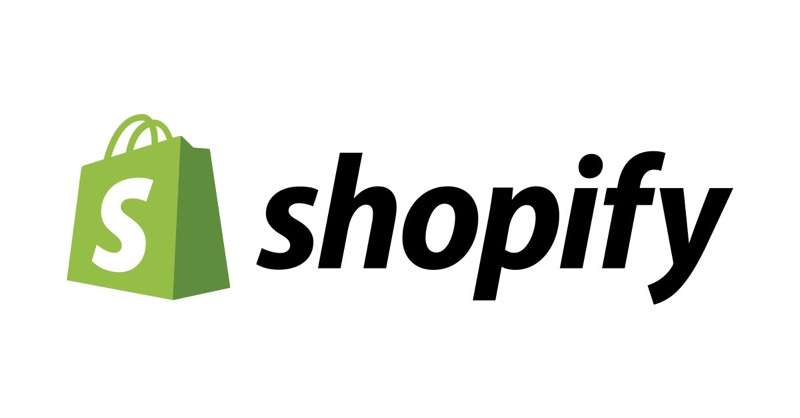
Even the payment processors are being taken care of by their back-end team.
Several other features of Shopify include:
- Dropshipping with Ordoro integration
- Refunds management
- Management of customer accounts and profiles
And more.
This lets you keep a track of customers and your products.
Talking about themes, Shopify offers a robust set of over 70 themes that let you create a professional website.
Moreover, you can edit any element on your site if you are braced with HTML and CSS knowledge.
The best part is — your customers can shop directly through social media platforms like Facebook.
Not just that, but, you can market your stores on other social media platforms like Twitter, Instagram, Pinterest, and more.
One of the most important features of any eCommerce store has to be the ability to track performance.
On Shopify, analytics can be tracked with the help of a comprehensive dashboard where you get a product report, export report, Google Analytics, traffic referral report, and more.
To enhance sales and loyalty, you get features like offering discounts, gift cards, and product reviews.
Now let us look at some pros and cons of Shopify, its pricing, and we will further delve into other platforms and look at what’s best for you.
Shopify Pros:
- 100 payment gateways including Bitcoin, iDeal, and PayPal.
- Automatic tax calculator
- Full blogging platform – a great advantage on the marketing front
- 256-bit SSL certificate – Ironclad security on all the pages, content and payment details
- No tech skills required to commence
- User-friendly platform
- Certified partners for prominent support
- Ability to use your own domain
- Ability to translate into over 50 languages
- Great app support
Shopify Cons:
- Transaction fees: if you are not using the Shopify’s innate payment processor, you are going to face the heat of 2% transaction fees
- Advanced features like real-time shipping rates, gift cards, and more are available only in the higher-tier plans
- Rigid URL structure making SEO complex
Shopify Pricing:
Now that we’ve seen what are the good points and the flip sides to Shopify, let’s glance through the pricing.
Firstly, you can start your free trial with Shopify which is a great start for anyone wanting to test the waters.
Then, Shopify offers a monthly payment pricing module only and presents a classic 3 tier pricing to its users. It looks like this:
- Basic Shopify: $29/month
- Shopify: $79/month
- Advanced Shopify: $299/month
Bottom line: Without the blink of an eye, we know Shopify is the best eCommerce platform available today. You get advanced features, user-friendliness, SEO compatibility, hosting, and other features that make creating an online store super convenient.
Not just that but it has great features on the content, marketing, and set up front.
The platform is a great choice for small, medium, and even large enterprises. Its affordable plans are apt for freelancers and solopreneurs.
Now, if you’re wondering why would one look for alternatives, then read on.
Why do you need a Shopify Alternative?
Although Shopify is one of the top eCommerce platforms today, your requirements could be different from what it has to offer.
Or, you simply want to try your hands on different platforms.
Certain elements in Shopify makes it better than other platforms and vice-versa.
Because let’s admit – running an online store is not a cakewalk. There go in various decisions before zeroing in on any one of the many solutions available.
There is no one size fits all, therefore, we are going to shed some light on the best eCommerce alternatives for Shopify.
By the end of this article, you will have a clear choice to make. Whether you are just starting out, or are looking to expand your already existing online business.
This comprehensive guide will fill you in on all the other Shopify alternatives, leading to enabling you to make an informed decision.
Here’s a list of top 10 Shopify alternatives I’m going to illuminate in this article:
- BigCommerce
- 3dCart
- Volusion
- WooCommerce
- Magento
- PrestaShop
- PinnacleCart
- Squarespace
- Wix
- Weebly
Let’s learn about their features, pros and cons, and finally, pricing.
Best Shopify Alternatives
1. BigCommerce – Best Shopify Alternative in 2024

Click Here To Try Bigcommerce For Free
BigCommerce has earned its number 1 position when we are talking about Shopify alternatives.
It is an open SaaS platform that encourages individuals to create their eCommerce stores and run a successful online business.
Platforms like BigCommerce, and many others, allow you greater flexibility and full control over your online business.
Not only does BigCommerce allow you to create and manage your online business but it also facilitates growth.
BigCommerce set-up comes with drag-and-drop functionality that makes it creating and setting up your store convenient. This way, you can add content in any order you wish to create without the hassle of coding.
Although the themes are stunning, you only have a handful of them; to be precise, 7 themes, unless you decide to go premium.
The cross-channel feature of BigCommerce is yet another feature that gives it an edge over other platforms. You can sell at various points including:
- Marketplaces: eBay, Amazon and Google Shopping
- Integrate with social media channels like Facebook, Pinterest, and Instagram
- Update in-store sales with POS systems
Apart from that, the platform also offers features like refunds & returns.
Moreover, to track your progress, you can watch the analytics tab and keep an eye on the performance.
Let’s now look at some pros and cons of BigCommerce.
- Localized payment
- Great work on the SEO front
- No transaction fees: this is great because you don’t have to bear the heat of additional fees with each sale.
- Steep learning curve
- Limited free themes
- With Shopify, you get abandon cart recovery tool with all of their plan. While with BigCommerce, this is possible only on their Plus plans.
- No support for RSS feed
- Difficulty creating simple pages such as the About Us Page
BigCommerce Pricing:
Now that we have seen how BigCommerce differs from Shopify and some features that make it a unique Shopify alternative, let’s illuminate its pricing.
BigCommerce offers a classic 3-tire pricing module which is quite similar to how Shopify classifies it. Unlike Shopify, this platform offers monthly and annual subscription, and quote-based pricing.
It looks like this:
- Standard: $29.95/month.
- Plus: $71.95/month.
- Pro: $269.96/month.
Lastly, if you wish to go for the Enterprise plan, you will get a custom quote. Speak to a BigCommerce marketer and they will help you out.
Regardless of the plans you go for, BigCommerce does not put up any transaction fees.
Bottom line: Overall, BigCommerce is a great Shopify alternative, despite both platforms providing more or less the same experience. This could be your choice if you have a low budget, yet, want advanced features like a payment processor, gift card, single-page checkout, and more.
However, there are also some flip sides to this platform such as a steep learning curve, so, the final choice sits on your business requirement.
Finally, its ideal customers are fast-growing merchants. BigCommerce is suitable for small, medium, and large enterprises.
Now let’s move on and see what are other eCommerce platforms that make up for a great alternative for Shopify.
2. 3dCart – Shopify Alternative With Great Marketing Features
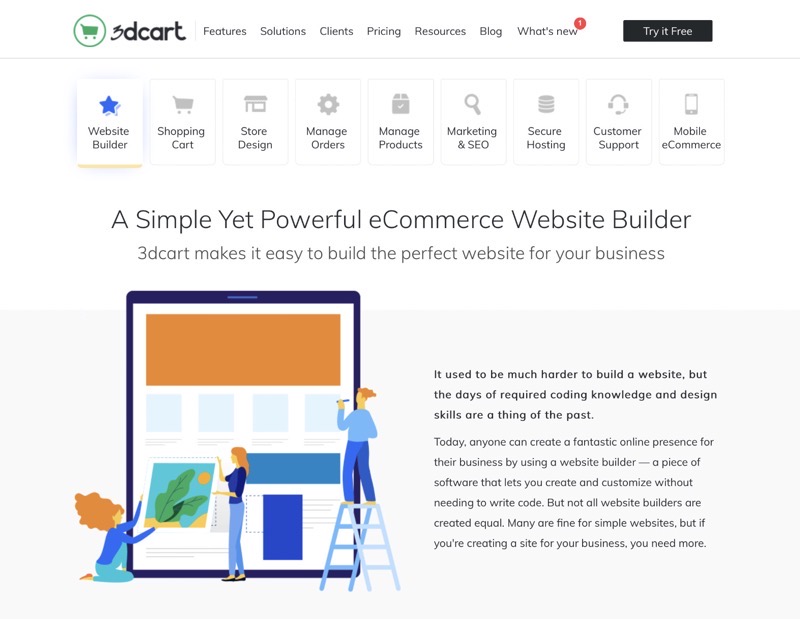
Click Here To Try 3dCart For Free
3dCart is a cloud-hosted shopping cart platform that is yet another tough competition for Shopify. Like BigCommerce, 3dCart is also quite similar to Shopify. Let’s look at the unique features it proposes.
3dCart comes with a full-fledged set of features, themes, unlimited storage options, and more. This platform supports scalability and is robust from the business perspective.
Apart from this, the marketing feature quite impresses its users. We all know how integral marketing is for any eCommerce store. The platform makes it easier for you even if you’re not a pro at marketing.
You get Abandoned Cart saver, AWeber integration, affiliate program, email marketing, and many more marketing features.
Furthermore, you can batch edit products, control inventory, and get a low stock alert.
Coming to payment methods, 3dCart does an impressive job. They accept Bitcoin currency, along with other payment modes.
All in all, they have over 160 payment gateways and international payment options as well.
Moreover, you get some great features even in the lowest package, which include upsell and cross-sell, social wish list, and unlimited product variant.
Now let’s shed some light on the good and not-so-good sides of 3dCart.
- In-house features like email marketing and CRM
- Faster load time and mobile store speed time
- Over 100 payment processors without charging any additional integration or transaction fees.
- Merchants get discounted processing fees since the platform integrates with specific third-party providers.
- This makes the online processing fees economical; it starts at 2.9% and goes to as low as 2.5%.
- Value for money: pricing for 3dCart starts at $19 a month which is cheaper than Shopify’s starting price.
- No drag-and-drop feature: this means you will have to edit your website using HTML/CSS code.
- Upgrading issues
- Shopify dropshipping is more convenient than 3dCart
3dCart Pricing:
3dCart proves to be economical and provides full value for the money.
If you’re new to building an eCommerce store, this is a great option for you. And if you have some experience up your sleeves, the platform does not seem to disappoint you either.
You get pretty good functions and features to scale your store.
The pricing module allowed by 3dCart is a monthly payment option.
3dCart pricing starts at $19/month and goes up to $114/month. This indicates that you can start with a low budget and still get plenty of features.
Moreover, it offers 5 different packages that seem to be catering to 5 different groups.
Here’s how all the packages of 3dCart look like:
- Startup store: $9/month ($7/month on annual package)
- Basic Store: $14/month
- Plus Store: $39/month
- Power Store: $64/month
- Pro Store: $114/month
The best part is: with all the packages, you get unlimited products. This makes it easier to start with the lowest package and move up the ladder as you grow and scale.
Bottom line: 3dCart is a great Shopify alternative; the only bummer is that it, firstly, does not provide a great UX. Secondly, building your website here is not as easy and not as intuitive as Shopify.
Also, if you do not happen to have coding wisdom, then, you will have to hire a developer for the same.
Its ideal customers include small, medium, and large enterprises and also freelancers and solopreneurs.
3. Volusion – Cheap Shopify Alternative
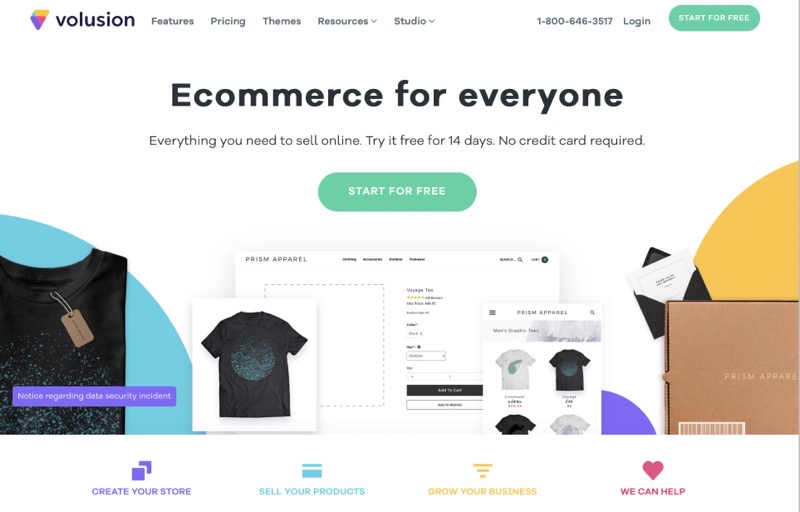
Click Here To Try Volusion For Free
Volusion is yet another big player in the market and makes its place in the top Shopify alternatives.
Volusion homes over 40,000 online stores. The achievements made by the Volusion merchants have been quite impressive.
On the designing front, if you don’t have coding knowledge, you can begin with their ready-to be-deployed templates.
The templates are pretty functional and can be used right away.
Moreover, if you have coding wisdom and would like to tweak a thing or two using HTML/CSS, you can do that as well.
This makes it a great platform for developers as well as complete beginners.
Moreover, even the templates start from free and can go up as high as over a whopping $800.
All of its designs are responsive and will work great across devices.
Always ensure that the designs are responsive, i.e., they can adjust to any device the user might be browsing at, to give them a great shopping experience.
You don’t want people to run away only because your site wasn’t functional.
Coming to the payment methods, Volusion offers a great range – from COD to PayPal and more, they’ve got you covered.
Moreover, the best part is that Volusion has its own payment gateway for customers based in the US.
Live shipping rate calculations for different carriers such as FedEx are also available.
You can also add products with an easy-to-use interface and manage your inventories.
- Volusion comes with a great set of features such as CRM
- Wide range of payment methods and low transaction fees
- Drag and drop builder
- Waitlist and backorders support
- Tax and shopping rates calculator
- Not intuitive as compared to Shopify
- Does not have an innate blogging platform – making it quite difficult for content marketing
- Creation of regular content pages is a bummer
- Volusion does not offer any App store
- The serious difficulty faced with content marketing
Volusion Pricing:
Volusion offers you a classic 3 tier pricing option but also includes an additional one where you can customize your plan. The platform offers a monthly payment option.
However, one thing you need to note here is that with each of the plans, you have a yearly sales limit. This can make it quite difficult to scale.
Here’s what their pricing and sales limit looks like:
- Personal: $29/month; Sales limit: $50,000
- Professional: $79/month; Sales limit: $100,000
- Business: $299/month; Sales limit: $500,000
Bottom line: while Volusion is quite similar to Shopify in terms of setting up, features, and themes, there are some serious setbacks. One of them being content marketing. Another drawback is the platform is not as intuitive as Shopify.
Its ideal customers include all kinds of enterprises as well as solopreneurs.
4. WooCommerce – Best Shopify Alternative For WordPress
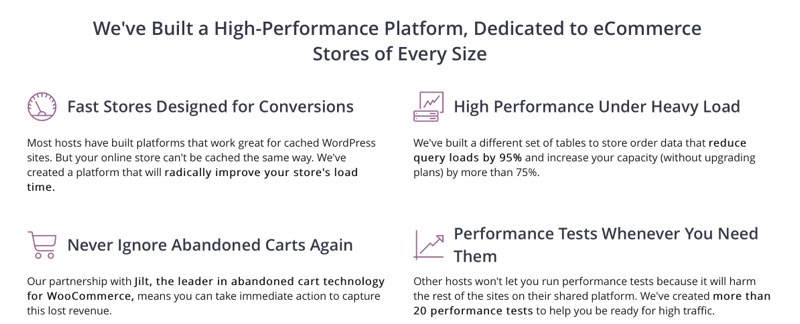
Get Managed WooCommerce Hosting
Let’s begin the introduction of WooCommerce with an interesting statistic: 30% of all online stores use WooCommerce for their eCommerce business.
WooCommerce is an open-source eCommerce platform and is built on WordPress.
If you already have your website on WordPress, this could be a great option for you. WooCommerce is a WordPress plugin that will make setting up your eCommerce store pretty quick.
A great feature of WooCommerce includes a 30 days money-back guarantee.
WooCommerce allows you to start for free which can be great for absolute beginners. Although scaling can be quite difficult, you can set up for free, without any monthly fees, and have to pay as you grow.
You only have to pay transaction fees as you make a sale.
This makes it a great Shopify alternative for those starting out or wanting to try the waters without having to pay for bells and whistles.
Both WordPress and WooCommerce come free of cost but I’m sure you do not want WordPress branding on your own online store. That’s when you will have to pay for hosting.
After paying just for the hosting, you can get an amazing, fully-functional mobile-friendly site.
However, if you have got some budget on your hands, you can always upgrade. To do so, you can pick up a few perks. The Product Bundle of WooCommerce starts at $49, plus, you can always pick up a few extensions on your way.
Apart from that, the additional costs could actually burn a hole in your pocket if you’re looking at great functionality.
Although some features come along with the free version, you will have to pay for the additional ones. For say, you get some free payment gateways but if you want more, like Stripe, etc. you will have to pay for it.
The same goes for the Shipping methods and other functionalities. Whereas Shopify has these services included.
Now, another addition for any eCommerce store has to be the SEO compatibility.
For WooCommerce, you can again install some plug-ins. Depending on your choice, you can go with the free or the paid version.
Getting your hands on WooCommerce will be easy when you already are acquainted with the WordPress dashboard since it is essentially a plug-in.
- Greater flexibility and full control
- Many free add-ons
- Option for a multilingual store
- Geo-location support
- Hidden costs
- Not really beginner-friendly if you have never used WordPress before
- Unlike Shopify, you will have to update manually
WooCommerce Pricing:
As mentioned earlier, both – WordPress and WooCommerce are free. However, for any additional service, you will have to pay.
Actually, you will be paying quite a lot considering this is an online store and you need to ensure everything runs smoothly.
Apart from that, you will have to set up everything on your own which can get quite cumbersome; if you don’t have a great knowledge of WordPress plug-ins, you can easily find yourself swimming in a pool of questions.
Another drawback of WooCommerce is troubleshooting.
Just in case your site goes down or any other technical issues come up, it could take a few hours to even days to return to normal. If you do not want sleepless nights, you would need to hire a developer – again, cost addition.
Bottom line: Lastly, WooCommerce is a great Shopify alternative given it’s a WordPress plugin, is user friendly, and more. However, it comes with its own set of setbacks.
These are some features you would otherwise get bundled with any Shopify’s package.
Its ideal customers are small and medium-sized businesses.
5. Magento – Best Open Source Shopify Alternative
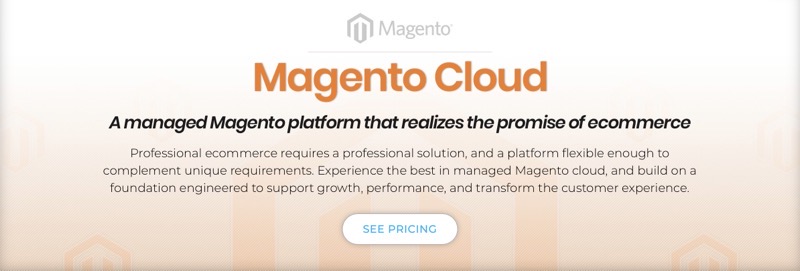
Get Managed Magento Cloud Hosting
Magento is yet another open-source platform. Given the fact, it is free as well, but you’ll have to pay the cost for hosting and domain.
While on one hand, you have full control over the website, on the other, it could prove to be really technical since it is not a plug-and-play platform.
Magento could be a great choice for big companies who want to build the store exactly the way they want to.
For this, you need to have a really good experience on your hands to be able to handle Magento. Ideally, Magento works well when you have an in-house team that could look after building, managing, and growing your online store.
Apparently, this platform is not really intuitive and will not work for newbies. If you’re just starting out, this platform could send you down a rabbit-hole.
Now the place where Magento really shines is its scalability, the ability to accommodate huge amounts of traffic and sales, and flexibility.
If you are ready to invest – both time and money – heavily in your online business then this is a great Shopify alternative for you.
The store needs to be built from scratch and its users don’t get other features that come along Shopify packages.
The best part about Magento, though, is you can build it any way that you like; you can build it as big as Amazon or keep it small and simple – your call.
It can handle huge sales volume, has a wide range of payment options, and has other advanced features.
- 100% control over your online store
- Ability to handle huge traffic and sales volume
- API availability for web services
- Responsive themes and designs
- Not beginner-friendly
- Requires coding skills
- Needs hosting
Magento Pricing:
As we discussed, it’s an open-source platform. You have to set it up your way, hence, the cost incurred would highly vary.
If you opt for the Community Version, it comes free. However, if you seek their Enterprise Edition where you get support from the Magento developers, the cost can go high up to a hefty $15,000-$50,000 a year.
Bottom line: Magento is an Adobe product and sadly, Adobe does not hold a great reputation for the products it acquires. So if you are using Adobe day in and out, it could be a great choice for you.
Other than that, newbies can find it difficult to comprehend. And compared to Shopify, Magento is super technical.
You should have an impressive eCommerce experience to be able to successfully run your store on Magento.
On the bright side, the platform is highly functional, you can build your site exactly the way you want and create a unique experience for your customers.
The ideal customer for Magento is a large enterprise.
6. PrestaShop – Great Shopify Alternative For Small Businesses

This is yet another impressive Shopify alternative. The platform powers more than 300,000 stores on its PHP-based open-source platform.
One thing that really shines in PrestaShop is its active community forums and resources that back you up with real-time support as an entrepreneur.
Along with that, they also offer you personal paid support. It is a great Shopify alternative for small businesses.
Again, being an open-source platform it is completely free but you will have to pay for hosting and other add-ons which brings the price similar to that you would invest in WooCommerce.
Talking about themes in PrestaShop, it’s not as impressive and varied as Shopify, but the platform does provide some decent themes for free, to begin with. The pre-installed theme is just one but you can get other third-party themes.
The best part is, it does not charge you any additional transaction fees.
Although it does require some coding knowledge, if you already have that or have hired a developer, then things should be comparatively easier for you.
Moreover, security, development, and maintenance is something you will have to take care of. So if you’re ready to invest in that, PrestaShop could be a great platform within budget.
- Community and personal support
- Being an open-source platform, it allows you to design the platform the way you wish
- Tax rules can be configured
- Requires coding knowledge
- Security, development, and management is all in your hands
- Addons can be quite steep on the pricing front. Example: Amazon marketplace addon can cost you $229.99, while this comes free with Shopify packages.
Prestashop Pricing:
As discussed above, PrestaShop is an open-source platform so it’s 100% free. However, the addons, hosting, security, and maintenance is something you will have to pay for.
Bottom line: PrestaShop is a great Shopify alternative since it provides you with the ease of setting up your store the way you want it to.
If you have technical skills, this could be a breeze for you.
But if you don’t, then you will have to outsource certain tasks including designing and site setup.
Also, a key thing to note here is that once you begin to outsource or hire someone to do it for you, you’ll have to manage, maintain, and look after security for yourself.
Moreover, other plugins can cost you quite a hefty sum while Shopify bundles it all in their packages.
So it could be a great choice when you know exactly what you want and have a good budget on your hands, otherwise, you should stick with Shopify.
PrestaShop is ideal for small and medium businesses, large enterprises, and freelancers/solopreneurs.
7. PinnacleCart
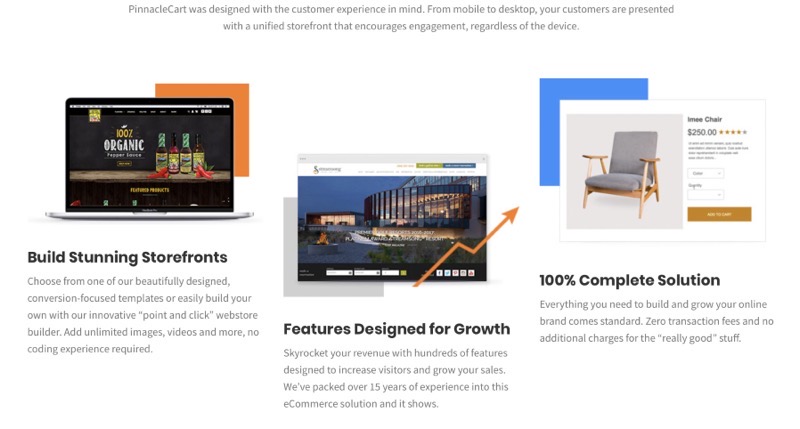
Click Here To Try PinnacleCart
PinnacleCart is yet another alternative to Shopify and powers over 30,000 online stores. It is an all-in-one webstore solution, so let’s see if it’s the right fit for you or not.
Starting with the hosting, the platform provides its own hosting services but you can also use any other hosting provider.
For this, you need to have a Perpetual License and the other hosting provider should comply with the platform’s technical requirements.
Coming to templates, you get over 12 free eCommerce templates with PinnacleCart, all of them being responsive.
The platform also provides great integration support with third-party apps like Avalara, MailChimp, Facebook, and more. However, Shopify center is more varied than PinnacleCart.
When you begin with PinnacleCart, you get a quick start guide which is really handy for beginners.
Another impressive feature of the platform is its payment gateways – Skrill, PayPal, Stripe, and more.
With PrestaShop, you get advanced features like one-click checkout, coupons, discount and gift cards, reports, and more.
One thing that shines in PinnacleCart is that you get Abandon Cart Remarketing in all of the packages.
You can even sell your digital products on this platform.
But, is that all to PinnacleCart?
Not really, have a look at its pros and cons to understand the platform better.
- Great set of features
- Hosting available
- Customizable store elements
- Ease of managing product list, shipping, payments and more
- Robust SEO and marketing features
- Steep pricing
- Steep learning curve
- Lacks built-in POS system
PinnacleCart Pricing:
PinnacleCart lets you start a free trial to know how things look. Then, you can switch to any of their plans and get going.
Its pricing module is based on a monthly and one-time payment.
Here’s what it looks like:
- Standard: $79.95
- Advanced: $199.95
It also has an Enterprise version where you can get custom quotes.
Considering the packages, PinnacleCart pricing is on the higher end as compared to Shopify.
Bottom line: PinnacleCart is yet another impressive Shopify alternative. The platform is cloud-hosted and is ideal for small and medium businesses as well as large enterprises.
8. Squarespace

Here comes an eCommerce platform that’s known for its sleek, classy and minimalist templates.
Although you don’t get a huge library to search from, all of the themes come with responsive designs. This means that your design would adapt depending on which platform the user browses.
Coming to setting up the store, it isn’t the best you would get since the store setting process isn’t exactly something you would learn quickly. At first, it might take you some time to get used to it and maybe a few trials and errors as well.
But the good part is that you can add both – physical and digital products and also gift cards. This step is pretty easy, though.
Moreover, the SEO compatibility is great on Squarespace – you can set up your URL, page title, and description.
SEO is key for any eCommerce store for all the obvious reasons. Your store has to be discoverable when somebody searches for your offerings. Beyond that, it needs to secure a good position in the search engines, and SEO options like the one stated above help you do just that.
Top it with their convenient inventory section that is quite easy to manage both on the desktop as well as a mobile app.
On the higher plans, your customers can sign in and get access to their carts at all times. Beyond that, with a waitlist option, your customers also get a feature to sign up and get a reminder for when their desired product is back in stock.
Now let’s talk about shipping features in Squarespace. Based on the item weight, you get flat rates or automated costs along with the carriers like FedEx and USPS. Moreover, you get dropshipping options with providers like ShipStation and ShipBob via the extension store.
For the support, you get email and FAQ options but not the phone calls.
- Faster checkout process
- Great SEO functionality and marketing
- Myriad of themes, features, and integration
- No App store
- Not really easy to use or intuitive. Might take some time to get your hands on this
- Transaction fees in the lower tier packages
Squarespace Pricing:
Squarespace offers you four pricing packages that come with their unique offerings, letting you select one that’s the best fit for you. The pricing module lets you pay on a monthly as well as annual basis.
Here’s what the pricing looks like:
- Personal: $12/month
- Business: $18/month
- Basic Commerce: $26/month
- Advanced Commerce: $40/month
Although you can start from the first package if you don’t have a flexible budget. But, one thing to note is you won’t get many features in it.
Advanced features include Abandon cart recovery and real-time shipping rates.
Moreover, what’s really a bummer is in the business packages, you will have to put up a transaction rate of 3%. This disappears as you move up the ladder.
Bottom line: Squarespace is a great Shopify alternative since it provides noteworthy features such as SEO, responsive design, and dropshipping.
Its flipside includes a lack of an automatic tax calculator so you’ll have to do the hard work manually.
Whilst other platforms like Shopify offer that option in their packages. Moreover, there is no way a customer can write a product review which is quite a bummer. Reviews help any business gain credibility and encourage buying decisions. Moreover, the payment modes are also not really impressive. You get only PayPal and Stripe as its payment options.
Overall, Squarespace is ideal for businesses as well as individuals.
9. Wix

Now, let’s talk about something if you are an absolute beginner.
You might have come in face to face with Wix when looking for the best website builder. Are you wondering how it makes its place in the Shopify alternatives?
To know if Wix stands up to being an eCommerce platform, read on.
Wix is essentially a website builder that also offers business-specific features like eCommerce.
Being an amazing website builder, Wix does help you in creating pleasing websites and comes with great design options and makes the work easier by providing a user-friendly interface.
With Wix, you get over 100 stunning templates that are highly customizable. Not only this but you get access to a full range of App market, editor, and more.
This makes Wix an extremely easy to use and plug-and-play eCommerce platform. Beginners can use this effortlessly without having to learn all the technicalities.
The way you can set your website comes in various forms. The two ways Wix allows you to set-up your website are:
1. ADI: Artificial Design Intelligence is a unique feature offered by Wix; this helps you create a beautiful and unique website based on your preferences.
You have to fill out a questionnaire based on which Wix applies its intelligence and suggests a configuration.
It suggests your unique combination of layout, images, background, contact form, and more. This is extremely useful if you are creating a website for the first time or simply want to save your precious time by using some help here and there.
2. Wix Editor: Another way you can create a website on Wix is through Wix Editor which comes with drag-and-drop functionality. This allows you greater flexibility and full control over how your end product (website) looks like. You can adjust, modify, shift some or all of your content on the page and set it the way you wish.
Now that we have seen the amazing features offered by Wix, let’s dive a little deeper and see both sides of the coin – pros and cons.
- Abundance of themes
- Over 200 apps, add-ons, and plugins
- Economical as compared to most other platforms
- Ease of use – intuitive
- Works with multiple payment gateways
- You can start for free (but with Wix branding)
- Traffic and bandwidth restrictions
- Limited applications as compared to Shopify
- Real-time shipping is available only in the US
- Not efficient from the growth and automation perspective
- Lacks on the SEO front
- No import and export option
While Wix comes with a fascinating range of themes and designs, it can get overwhelming for the same reason. Moreover, when we are looking for alternatives to an eCommerce store, we should focus more on how the site performs. Now let’s look at its pricing options.
Wix Pricing:
The best part about Wix is the economical pricing structure that makes for a good package for anyone starting out. Its pricing module lets you pay annually only.
- Business Basic: $23/month
- Business Unlimited: $27/month
- Business VIP: $49/month
A very important thing to note here is with all the templates and drag and drop features, the set up may be extremely easy. However, if the site is not functional enough, your online store might suffer.
Bottom line: Wix is the best option for you if you already have your website up on Wix and want to simply switch to an eCommerce platform. While this platform is easy to set up and comes with an impressive set of themes, you want to ensure you don’t sign up for just the bells and whistles.
Finally, the platform is ideal for small-medium sized businesses and freelancers.
10. Weebly
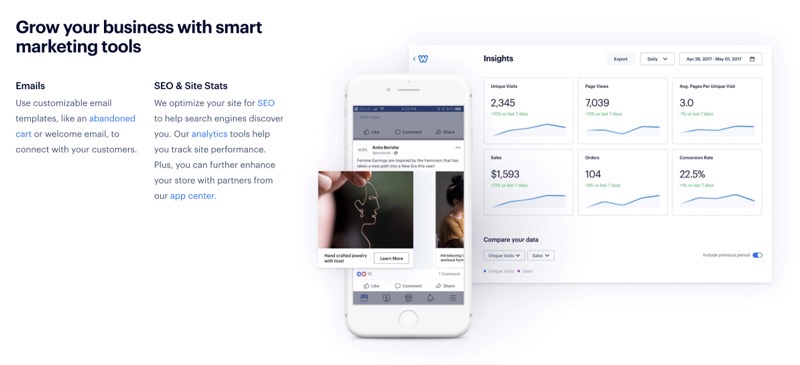
Weebly is a San Francisco based company, founded in 2007. Weebly is quite a robust platform and powers more than 40 million websites. That’s huge.
But the bigger question here is – is it the best Shopify alternative available out there, moreover, is it right for your business’ type?
Let’s figure out!
Weebly is now powered by Square. It also has a great community packed with industry experts and entrepreneurs. This could be a great add on for you if you like to socialize and meet new people.
Weebly has always focused on its core product which is actually their unique selling point. Although it is not a tough competition to other platforms on the marketing front.
The dashboard of Weebly is highly intuitive. The image blocks, text block, and slides block are super convenient to use. You can choose to add or modify and prepare your site just the way you like it.
One area where Weebly shines is its feature-rich blogging.
To add further functionality, you can access their app center and add the apps of your choice to make your website highly functional. This could include the FAQ section, tabs, and more. All you have to do is drag and drop the tabs on the page and you’re good to go.
It’s that simple.
Coming to themes, Weebly has our hearts. Weebly offers amazing themes even in their free website builder and you can very easily edit the themes with your own media. Moreover, all the themes are highly-responsive.
If you want to opt for email marketing, it is available only in the highest package. Moreover, an automatic tax calculator is also a great option but not available on all the packages. This means the more features you want, the more you will have to pay.
But the best part is – you get SEO in all the packages such as page permalink, page description, meta keywords, and more.
The support you can expect from Weebly is through the community forum, email and chat, and phone calls.
- Ideal for small businesses
- Intuitive, easy to set up and get started
- SEO functionalities are a plus
- Responsive templates
- Drag and drop functionality
- Backup features are not really good
- You may need coding for site building which could be a bummer
- It does not offer ADI
- Does not allow customers to login
Weebly Pricing:
While Weebly’s website packages start with a free plan, its eCommerce packages start at as low as $12/month.
Weebly does a great job of offering a free plan, to begin with. This lets you test the website before going all in.
Here’s what the pricing for Weebly looks like:
- Pro: $12/month
- Business: $25/month
- Business Plus: $38/month
Bottom line: Although Weebly is a great Shopify alternative in terms of themes, site set up and SEO, it comes with a set of its own drawbacks.
Its pricing is pretty simple as well – you get what you pay for. The lowest tier does not offer features like email marketing. Even in the highest plan, it could get cumbersome to scale after a certain point.
It is ideal for small, larger, and even medium enterprises. Moreover, it is apt for freelancers as well.
Final Thoughts
It’s time to call it a day – let’s wrap up our top 10 Shopify alternatives.
Although Shopify is one of the best eCommerce stores in today’s day since it comes with extensive features, is user-friendly, and lets you easily manage and grow your store, it simply might not be the right fit for your business’s type.
You may have outgrown Shopify or would be looking for some affordable solutions. In either of the cases, this article covered open-source platforms, PHP-based sores, and website builders.
At the end of the day, you do you. With these alternatives, you can gain a good understanding of the platforms and see if it aligns with your goals, budget, skills. Have a realistic approach and go for a platform that seems promising to give you the desired outcomes.
Click Here To Try Bigcommerce For Free
Read Next:
Leave a Reply